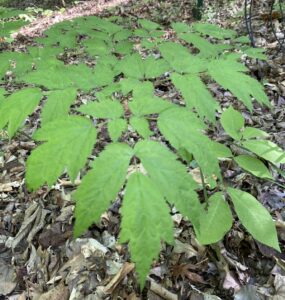
Menopause is widely associated with uncomfortable hot flashes, but many women also suffer from vaginal dryness during and after menopause (Climacteric, March 3, 2016). When tissues of the vulva and vagina atrophy, sexual intercourse may become painful. Needless to say, pain can cause trouble. In such situations, women may experience difficulties with their relationships. Doctors frequently prescribe estrogen to overcome vaginal dryness, either as pills or as vaginal creams or Estring (estradiol intravaginal ring). Another option is a softgel vaginal insert containing estradiol (Menopause, Aug. 19, 2019). However, women who have had breast cancer and those who have a family history of breast cancer may be reluctant to use estrogen. They might prefer natural approaches to manage this problem. So do some women who find that estrogen produces side effects.
Black Cohosh Might Help Overcome Vaginal Dryness:
Q. When I first complained about vaginal dryness, my gynecologist didn’t discuss any natural remedies. She immediately wrote a prescription for estradiol cream. It wasn’t in my insurance formulary, so I had to pay full price.
After only one application, I had a very bad headache. My blood pressure shot up and remained high for weeks. I was afraid to use the cream again for fear of a stroke. Currently I take black cohosh, and that seems to reduce the dryness and discomfort.
A. Black cohosh (Actaea racemosa) is a North American plant with a reputation for easing menopausal symptoms. A recent review of 22 randomized controlled trials of black cohosh extract found it is more effective than placebo for improving overall symptoms of menopause as well as hot flashes (Menopause, July 1, 2023). A previous study comparing black cohosh to hormone therapy did not find that this herbal product eased vaginal dryness (Menopause, Jan-Feb. 2008). We’re glad to learn that you found it helpful. Read on for some additional ideas.

Cocoa Butter for Vaginal Dryness?
Q. My gynecologist recommended cocoa butter wafers to overcome vaginal dryness. I bought some online. He told me to insert one at bedtime (I use half a wafer). It melts quickly and really works.
I have one issue, though. Although I love the smell of chocolate, it is a bit weird having that bag of cocoa butter wafers in the bedroom/bathroom – sure does have a strong smell of chocolate!
A. We could find no research supporting cocoa butter as a vaginal lubricant. That said, the third edition of the book, Diagnostic Gynecologic and Obstetric Pathology (2018) does mention it for the management of atrophic vaginitis.
To quote:
“Some authorities recommend topical application of cocoa butter, beeswax, or mineral oil to aid with sexual activity. These should be used with caution because they may clog the pores.”
We don’t have a solution for the smell of chocolate!
The Harvard Women’s Health Watch (June 19, 2019) mentions olive oil as a natural vaginal lubricant. Like cocoa butter, it may also serve as a moisturizer to be applied daily and not only prior to intercourse. Some women are allergic to topical olive oil, however. A woman who is considering using olive oil (or other natural moisturizer to overcome vaginal dryness) should test it on the skin of her forearm before placing it in any sensitive areas.
Other Natural Approaches:
Many women report that coconut oil is useful as a vaginal moisturizer. Others like to use aloe vera gel as a lubricant. One commercial product, Sylk, contains kiwifruit extract and is water-based. This may be important for couples using condoms, as olive oil, mineral oil, coconut oil or even cocoa butter can damage latex.
One reader is enthusiastic about Sylk:
Q. I read your column and came across a question from a woman who asked about non-hormonal treatments for vaginal dryness.
I’ve been using a product called Sylk for over a year now. For me, it does a great job in lubricating and relieving the pain associated with vaginal dryness during sexual intercourse. I read that it comes from New Zealand. Do you know what is in it?
A. According to the manufacturer, Sylk is made from kiwi vine gum extract. The vines in the region of Pukekohe, New Zealand, are trimmed during the process of harvesting kiwi fruit. The compound is extracted from these prunings and used to make this water-based lubricant. Sylk is available online.
Lubricants such as Astroglide, Bioglide, Balance Activ or Good Clean Love Lubricant are also appropriate when latex comes into play. Some of these may cause irritation, however, so it makes sense for a woman to try a few to see which one suits her best. She may also want to inquire about pelvic floor muscle training, as this can help with the symptoms of vaginal dryness and may also be beneficial for urinary problems (Frontiers in Endocrinology, online Aug. 21, 2019).
Citations
- Edwards D & Panay N, "Treating vulvovaginal atrophy/genitourinary syndrome of menopause: How important is vaginal lubricant and moisturizer composition?" Climacteric, March 3, 2016. doi: 10.3109/13697137.2015.1124259
- Constantine G et al, "Early onset of action with a 17β-estradiol, softgel, vaginal insert for treating vulvar and vaginal atrophy and moderate to severe dyspareunia." Menopause, Aug. 19, 2019. DOI: 10.1097/GME.0000000000001394
- Sadahiro R et al, "Black cohosh extracts in women with menopausal symptoms: an updated pairwise meta-analysis." Menopause, July 1, 2023. DOI: 10.1097/GME.0000000000002196
- Reed SD et al, "Vaginal, endometrial, and reproductive hormone findings: randomized, placebo-controlled trial of black cohosh, multibotanical herbs, and dietary soy for vasomotor symptoms: the Herbal Alternatives for Menopause (HALT) Study." Menopause, Jan-Feb. 2008.
- Nappi RE et al, "Addressing Vulvovaginal Atrophy (VVA)/Genitourinary Syndrome of Menopause (GSM) for healthy aging in women." Frontiers in Endocrinology, online Aug. 21, 2019. doi: 10.3389/fendo.2019.00561

